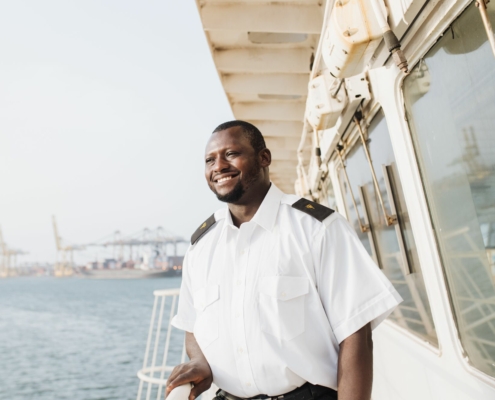 https://mercyships.africa/wp-content/uploads/2023/08/SNC220418_MARITIME_COLLEGE_STUDENT_BANGURA_JM012_HI-MID.jpg
1335
2000
shawnthompson
https://mercyships.africa/wp-content/uploads/2022/04/mercy-ships-logo-menu-africa-300x138.png
shawnthompson2023-08-17 03:00:002024-02-06 17:28:10Sierra Leonean Mercy Ships Volunteers Look Forward to Bringing the Global Mercy™ Home
https://mercyships.africa/wp-content/uploads/2023/08/SNC220418_MARITIME_COLLEGE_STUDENT_BANGURA_JM012_HI-MID.jpg
1335
2000
shawnthompson
https://mercyships.africa/wp-content/uploads/2022/04/mercy-ships-logo-menu-africa-300x138.png
shawnthompson2023-08-17 03:00:002024-02-06 17:28:10Sierra Leonean Mercy Ships Volunteers Look Forward to Bringing the Global Mercy™ HomeMercy Ships Africa Blog
 https://mercyships.africa/wp-content/uploads/2023/08/SNC220418_MARITIME_COLLEGE_STUDENT_BANGURA_JM012_HI-MID.jpg
1335
2000
shawnthompson
https://mercyships.africa/wp-content/uploads/2022/04/mercy-ships-logo-menu-africa-300x138.png
shawnthompson2023-08-17 03:00:002024-02-06 17:28:10Sierra Leonean Mercy Ships Volunteers Look Forward to Bringing the Global Mercy™ Home
https://mercyships.africa/wp-content/uploads/2023/08/SNC220418_MARITIME_COLLEGE_STUDENT_BANGURA_JM012_HI-MID.jpg
1335
2000
shawnthompson
https://mercyships.africa/wp-content/uploads/2022/04/mercy-ships-logo-menu-africa-300x138.png
shawnthompson2023-08-17 03:00:002024-02-06 17:28:10Sierra Leonean Mercy Ships Volunteers Look Forward to Bringing the Global Mercy™ Home
Sierra Leonean Mercy Ships Volunteer Gets Ready to Welcome the Global Mercy™
Blog, BlogWhen David Kpakiwa thinks about the surgical need in his home country of Sierra Leone, he gets emotional.
It’s not just because he cares about his countrymen and women.
It’s because for him, this issue hits close to home.
“When I was a kid, my mom got sick and she needed surgery,” he said. “But in our community, they could not provide that.”
David’s mother would have to leave their home in the Kono District to find treatment, but the travel was too expensive. David was young, but he carried a lot of responsibility as a provider for his family. He began supporting his family at the age of 8, working long hours on a farm to bring home money to his mother.
“I spent a lot of time looking at my mom’s suffering,” he said.
Although she was finally able to get the help she needed, David never forgot the experience.
“The memories are there,” he said. “They’re fresh.”
David’s family is not unique among Sierra Leoneans. There are fewer than three surgeons for every 100,000 people in the population, but those surgeons are distributed unequally across the country. That means surgical care is inaccessible to the majority of people. Estimates of the unmet surgical need in Sierra Leone reach as high as 91%.
David’s mother was just one of those people who couldn’t access the care she desperately needed – leaving a lasting impact on those who loved her most. That’s why now, years later, as David prepares the way for the Global Mercy™ to arrive in Freetown, Sierra Leone, he takes his job personally.

The Next Chapter: Igniting Hope and Multiplying Impact in Sierra Leone
Blog, BlogGrowing up on board the floating hospitals of Mercy Ships, Dr. Sandra Lako’s childhood was anything but normal. She was just a teenager when she first sailed into Sierra Leone and encountered a country that would define the course of her life.
There, Sandra left the hospital ship to accompany a medical team as they set up a clinic in a village outside of Freetown, tending to a measles outbreak. Sandra spent the week sitting with mothers who were bringing their sick children for care.
“Of course, I was a teenager, so not skilled to actually help medically, but I was able to help the moms who were giving their children fluids to rehydrate them,” remembers Sandra. “Sadly, a couple of children died that week. That really had an impact on me… Those experiences are really what determined my plans to go to medical school.”
Sandra went on to study medicine in her home country of the Netherlands. Years later, she returned to Sierra Leone to help establish a Mercy Ships health facility in Freetown, providing obstetric fistula care for women with childbirth injuries as well as child health services.
Eighteen years later, Sandra still calls Sierra Leone home.
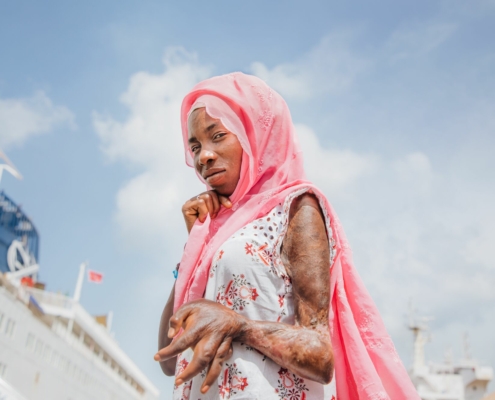
Healed After 27 Years: Coumba’s Journey
StoryCoumba was at her family’s farm on the day that her life changed forever.
“Our mother used to cook with fire,” she said. “It was a big farm, so my mother would start a fire in one place, then go to another. My little brother was playing by the fire, got too close, and started to burn.”
At just 4 years old, Coumba rushed in to save her brother as the fire grew.
“I fell on my left side, so I burned there,” Coumba said. “My brother was then crying a lot, which my mother heard, so she came to us, but I was already entirely burnt on my left side.”
With her left arm fused in a bent position and her hand damaged, Coumba adjusted to life with only one functional arm and hand. She grew up to marry, work as a maid, and raise three children on their rice and vegetable farm in northern Senegal. Coumba longed to take care of the farm herself, like many other women do in Senegal, but her limited range of motion made this dream impossible.
After decades of living with a bent arm, surgery on the Africa Mercy® meant that at the age of 31, Coumba’s life was about to change.
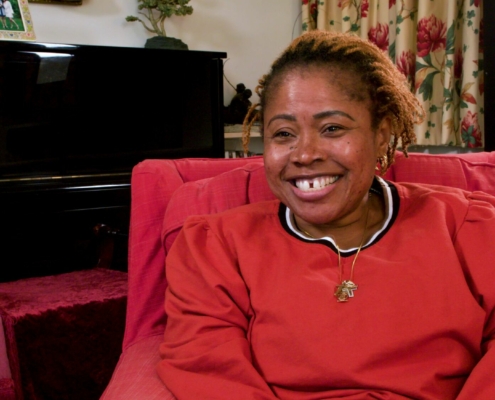
From the Brink of Death to New Life: How One Act of Kindness Changed Everything
Blog, BlogFor Catherine Conteh, there’s a moment from the birth of her daughter that still plays over and over in her mind, 30 years later. She had been lying in her hospital bed in Sierra Leone, in labor, writhing in untreated pain, for four days straight. The doctors told her that due to complications with her labor, she needed a Caesarean section surgery – one that 18-year-old Catherine and her husband, Augustine, couldn’t afford. Without payment up front, she would not be given the surgery.
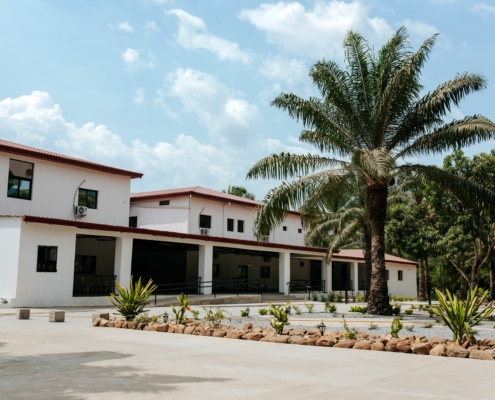
Mercy Ships Partners with Hope Ignited to Launch Guinea’s First Pediatric Center of Excellence
Blog, BlogIn a brightly decorated hospital room in Dubréka, Guinea, baby Mory is being examined by a pediatric surgeon. The surgeon gives Mory’s anxious parents a big smile and a thumbs up – all is well.
When the surgeon first saw Mory a few months ago, he was severely malnourished and dangerously underweight. Now, after regular treatment and several follow-up appointments, he’s reached a healthy weight and is being sent home, much to the relief of his parents.
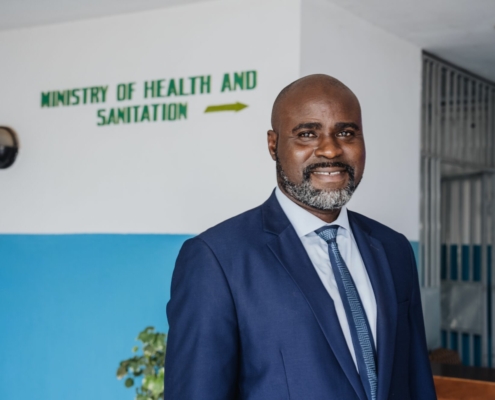
Sierra Leone’s Journey for Better Health: Overcoming Obstacles and Embracing Partnerships
Blog, Blog, NewsFor those of us on the ground in Sierra Leone, the challenges we face daily in providing healthcare services underscore the grave disparities present across the various corners of our planet when it comes to our ability, or lack thereof, to heal.
In Sierra Leone, the most dramatic example of the challenges we face is the severe lack of qualified professionals equipped to handle our nation's diverse and growing healthcare needs, particularly in relation to surgical care.
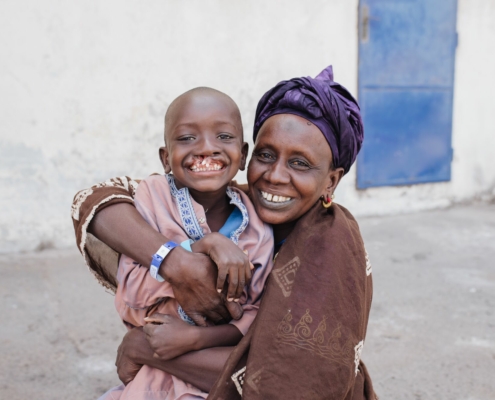
‘The Gifts Within’: Hamadou Finds Hope
Blog, Blog, StoryHamadou was 4 years old when he came to the Africa Mercy® in Senegal.
By then, he had learned to cope with the physical limitations of his cleft lip, a gap in his upper lip that impacted his ability to swallow and eat, as well as how his teeth were growing. But the cleft lip continued to hold him back socially, even within his own family.
People in Hamadou’s community drink their water from a large pot that they share with other members of their household, as well as any guests.
“People would not want to drink from the same water pot as him,” said his mother Hawa.
While Hamadou was isolated in some ways, his mother was always by his side providing constant support.
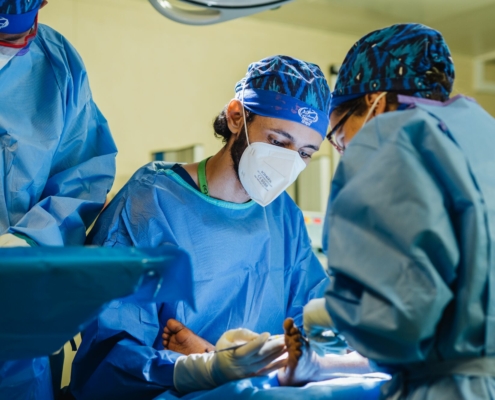
The Journey to Becoming Senegal’s First Pediatric Orthopedic Surgeon
Blog, BlogIn Senegal, a nation of over 16 million people, there is currently not a single children’s orthopedic surgeon.
It’s a need that’s immense – and immediate. Without a local specialist, children with lower limb conditions in Senegal must wait for a doctor from another country to visit.
The lack of in-country children’s orthopedic surgeons means that bone conditions can take a long time to be treated, if at all. These conditions can lead to severe disability and drastically affect a child’s quality of life. Such bone conditions include clubfoot.
